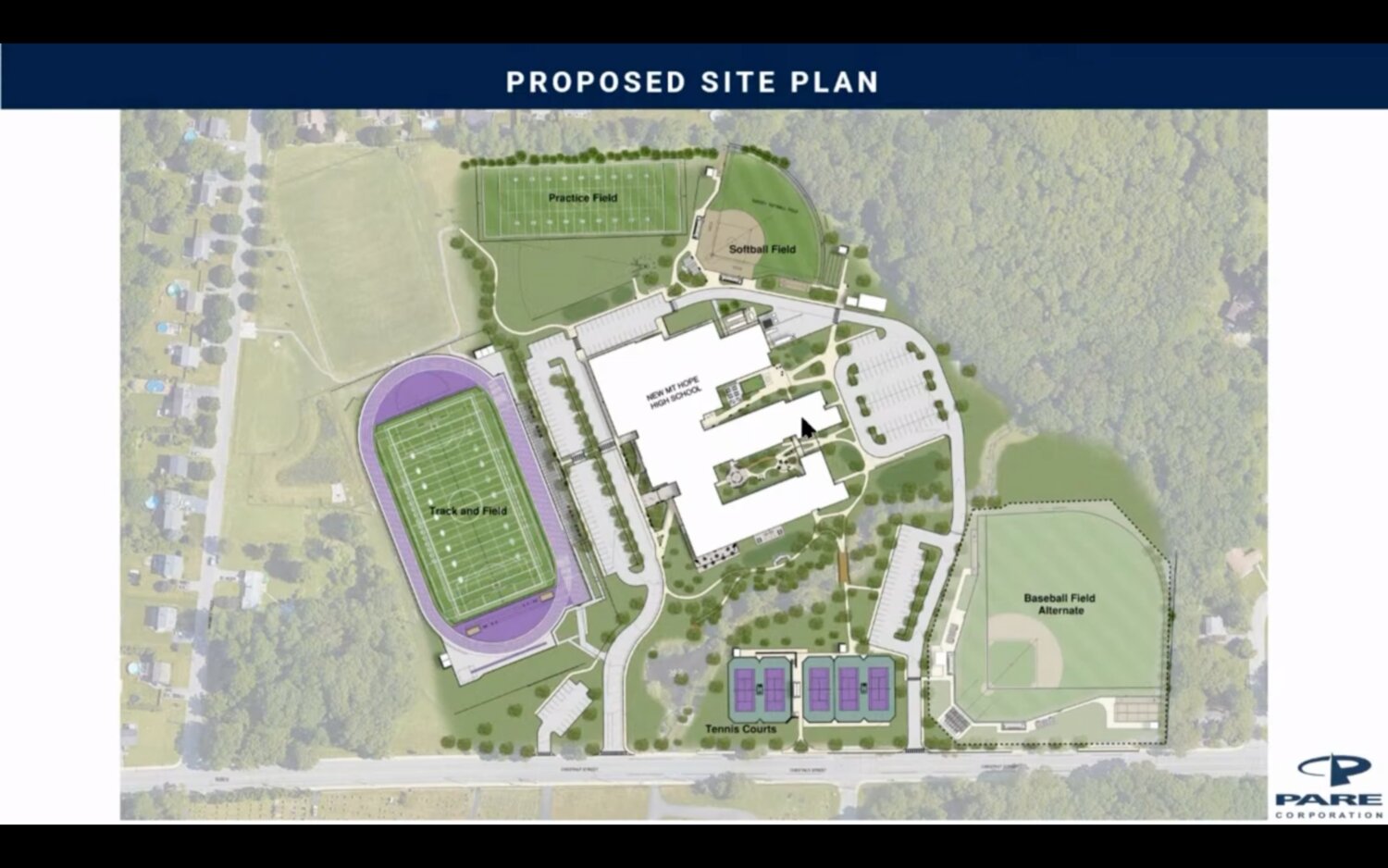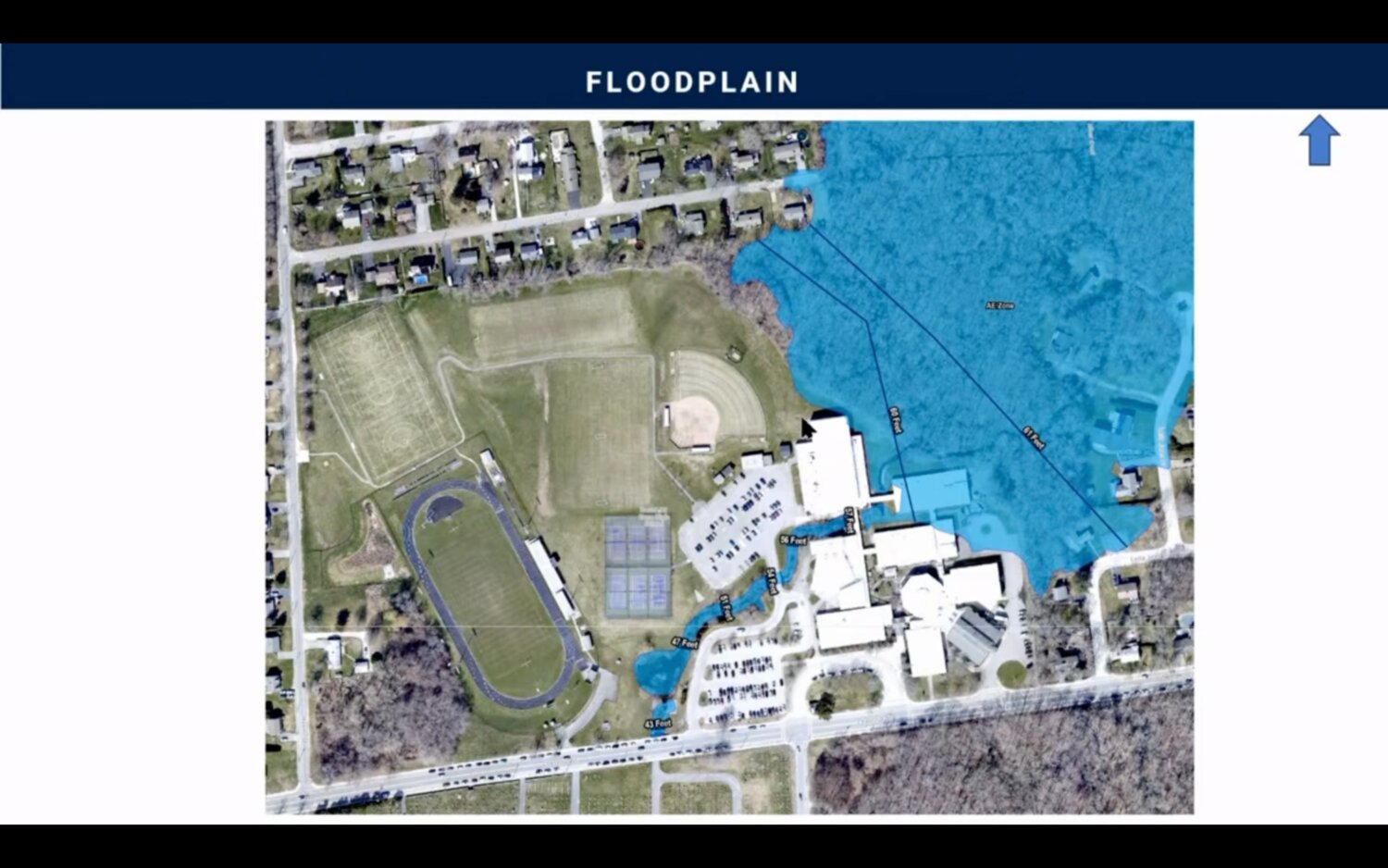Bristol Planning Board requests more info on new high school plan
Sticking points including drainage, irrigation, parking, and artificial turf force a continuance of project's first local approval into next month.
This item is available in full to subscribers.
Please log in to continue |
Register to post eventsIf you'd like to post an event to our calendar, you can create a free account by clicking here. Note that free accounts do not have access to our subscriber-only content. |
Day pass subscribers
Are you a day pass subscriber who needs to log in? Click here to continue.
Bristol Planning Board requests more info on new high school plan
After an Aug. 28 meeting of the Bristol Planning Board’s Technical Review Committee (TRC) raised several concerns, the Sept. 12 Master Plan review for the proposal to construct a new Mt. Hope High School, including new tennis courts and athletic fields, appeared to do little to put those concerns to rest.
Engineers presented before the full Planning Board, which was also an opportunity for the public to speak about the plans.
While the presenting engineers were hoping for approval of the initial phase, they did not receive it at Thursday’s meeting, and were asked to return with more detailed plans at the next Planning Board meeting, scheduled for Oct. 10.
The key concerns expressed by the members of the Planning Board include the reduction of approximately 40 spots (from 280 on-site to 240), as well as stormwater drainage, irrigation, and the plan to add an artificial turf field.
Members of the Planning Board had several concerns about the artificial turf field, regarding both the health and safety of the students, as well as Silver Creek. A myriad of studies have suggested that some artificial turf fields pose physical risks to both players and the environment, causing abrasions and infections to athletes, and contain carcinogens and so-called “forever chemicals,” which could potentially then leach into Silver Creek and, eventually, Bristol Harbor.
The TRC meeting also sounded the alarm about the plan to tap into the town’s water supply, and pay Bristol County Water Authority (BCWA) retail rates, in perpetuity, to irrigate the property and athletic fields with potable water, rather than taking advantage now of the 80% state match and dig one or more wells to provide the necessary irrigation.
Finally, the TRC directed that no increase in stormwater should be allowed along the Silver Creek Watershed, something that would become even more challenging to achieve given the fact that the proposed artificial turf would increase the impervious land on site by nearly two acres.
This last issue was of particular concern to residents of adjacent, flood-prone Dartmouth Street, including Ted Spinard, who called for a comprehensive and detailed assessment of the impact this project will have on flooding in his neighborhood.
“This is not a viable project primarily because of the watershed problems that exist on the property,” said Rayona Clemens, who also spoke during the public comment period. “Understanding the history of Bristol is imperative with any project of this magnitude, especially when it comes to student safety and environmental impact.”
As these issues were all brought up at the TRC, and according to notes from that meeting, the applicant was to have responded to these concerns prior to approval, the Planning Board was frustrated by the lack of specific details regarding the artificial turf and proposed wells presented at this Master Plan review.
In addition, the principal stakeholders — the BWRSD administration and School Committee — were notably absent, leaving project engineers to attempt to answer questions and concerns, some of which were outside of their purview.
“I think the Board was dissatisfied that the owners were not at this meeting,” said Charles Millard, Planning Board Chairman. “The Superintendent and School Committee chair should have been there as stakeholders, and not left it to the engineers.”
Project engineers seek to reassure abutters
On Monday evening, Sept. 16, Bristol Warren Regional School officials, including Superintendent Ana Riley, School Committee Chairperson Nicky Piper, and members of the district’s project management team, held an abutters meeting to discuss some of the same concerns brought up at the Bristol Planning Board; particularly about stormwater and flooding concerns for neighbors in the area.
David Potter, civil engineer from the district’s engineering firm, Pare Corporation, explained to a small gathering of neighbors that they are not only committed, but are required to, figure out solutions for the stormwater and drainage issues that continued to be front of mind for residents skeptical of the project.
“It’s a tough site, we know how tough a site it is,” Potter said. “And I think seeing it firsthand is very important. None of us are minimizing drainage, especially not the civil engineers. We are not minimizing drainage or the flooding concerns.”
Potter said that the engineering team had drilled dozens of test pits over the summer throughout the entirety of the site to get an accurate representation of the water table and how (and where) water drains from the site, and that due to state DEM regulations (in addition to local regulations), the project team must be able to show scientifically that the new school and accompanying site features (like artificial turf playing fields) will not worsen existing conditions in order to receive approval.
“We have to deal with the constraints that we have, but we still have to achieve the job to address your neighbors’ concerns. We can’t have more runoff leaving the site at a faster rate than we can in the existing condition,” he said. “DEM reviews it, the Town reviews it; we can’t do it. That’s our challenge, to get the right orientation of all these different systems to perform that.”
However, Potter said that the more detailed scientific plans regarding stormwater management were not required until they reach the preliminary stage of approval with the Town of Bristol.
“Once we get through Master Plan, the next step is to do all this detail, and get into the detail for all of the stormwater management systems,” he said. “We put together a stormwater management report that goes through the design of every single best management practice on this and tells DEM where the water level is for this detention basin, and that detention basin. We have to put the details in the plans and go through a lot of information to show them that we’re complying with DEM’s stormwater management plan.”
Potter said that, should they receive Master Plan approval, the engineering work to prepare for preliminary approval would take probably a couple of months. He said the hope was to have the first phase of the construction — the building of the athletic fields while the current school building remains occupied — begin in the spring of 2025.









